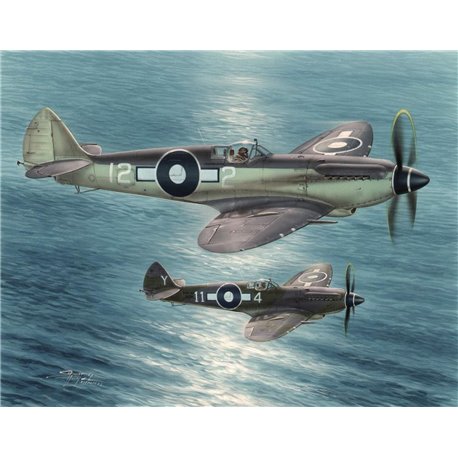No products
Supermarine Seafire F Mk.XV Far East Service - 1/48
SH48116
New product
Supermarine Seafire F Mk.XV Far East Service
Weight 0.3542 kg
Era Word War II
Origin british
Scale 1/48
You can build different versions with the content of this box:
- Seafire F Mk.XV, unknown serial number, 13-9/1: No. 806 FAA Squadron, RAF airbase, Trincomalee, Ceylon, summer 1945.
- Seafire F Mk.XV, SR537, 13-2/N, B flight of No.806 FAA Squadron, HMS Implacable, February 1946.
- Seafire F Mk.XV, SW786, 11-4/Y, No.806 FAA Squadron, 16th Carrier Air Group, HMS Glory, September 1946.
- Seafire F Mk.XV, serial over painted, white “122”, No. 806 FAA Squadron, 16th Carrier Air Group, HMS Glory, September 1946.
This product is no longer in stock
Data sheet
| Scale | 1:48 scale |
| Material | Plastic |
| Assembly | Kit |
| Finish | Unpainted |
More info
Supermarine Seafire F Mk.XV Far East Service
Weight 0.3542 kg
Era Word War II
Origin british
Scale 1/48
You can build different versions with the content of this box:
- Seafire F Mk.XV, unknown serial number, 13-9/1: No. 806 FAA Squadron, RAF airbase, Trincomalee, Ceylon, summer 1945.
- Seafire F Mk.XV, SR537, 13-2/N, B flight of No.806 FAA Squadron, HMS Implacable, February 1946.
- Seafire F Mk.XV, SW786, 11-4/Y, No.806 FAA Squadron, 16th Carrier Air Group, HMS Glory, September 1946. In 1946 this machine also operated from Kai-Tak airfield in Hong Kong.
- Seafire F Mk.XV, serial over painted, white “122”, No. 806 FAA Squadron, 16th Carrier Air Group, HMS Glory, September 1946.
History
To boost the performances of new Seafire versions, Supermarine Company similarly to Spitfire development used R&R Griffon engine. Slightly heavier and bigger Griffon engine offered considerably higher power output than R&R Merlin that powered Seafire Mk.I—IIIs. The development of Griffon powered Seafire version was started in 1943.
The new version was somewhat crossover of several existing Spitfire and Seafire versions. The fuselage was taken over from Seafire Mk.III, tail planes were from Spitfire Mk.VIII and altogether it was powered by Griffon Mk.IV driving four-bladed Rotol propeller. Later version of Spitfire, particulariy Mk.XII was powered by same engine. But the new Seafire designated Mk.XV was equipped with symmetrical coolers under each wing's halves. The armament consisted of two 20 mm cannons and four 7.7 mm machine guns. The mass production started at Cunliffe-Owen (182 produced machines) and Westland (246 machines); Supermarine manufactured only the prototypes. The first 51 produced aircraft were still equipped with "A" arrestor hook mounted below the fuselage. This assembly unfortunately strained the already strengthened fuselage and therefore the subsequent machines were equipped with "Stingef" arrestor hooks located at the end of the fuselage. This solution led to the change of the vertical fin's rudder. Initially Seafire suffered by griffon engine troubles; the compressor’s clutch often slipped during take-offs. Seafire Mk.XV came to combat squadrons in 1945 with possible assignment to Far East. However, these machines came too late to take part in the fights there. Eventually, eight combat FAA
squadrons were equipped with Seafire Mk.XVs. Seafire were also exported to Canada, France and Burma.
Royal Canadian Navy used these Seafires aboard HMCS Warrior, the sole Canadian aircraft carrier, and on
ground bases. Similar deployment occurred in France with Aéronavale. French Seafires operated from aboard Arromanches aircraft carrier as so from the ground bases. Burma stripped a]! naval equipment from their Seafires and deployed them against China supported Communist terrorists in 1950. Since 1947 when the change in designation of British aircraft was introduced, this Seafire version was re-designated to Mk. 15.
Technical Data: Wing Span: 11.23m, Length: 9.71 m, Max. Speed: 616 kmh, Range: 692 km/without external fuel tanks, Service Ceiling: 12,000 m.







